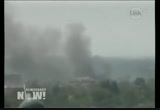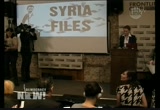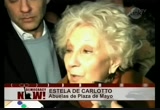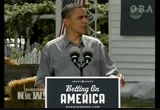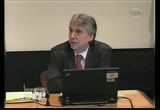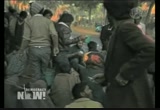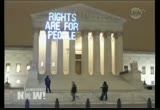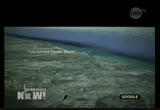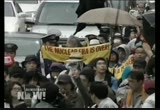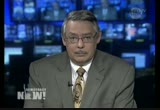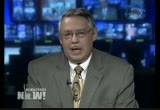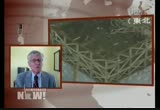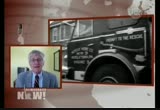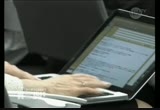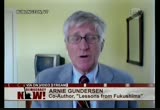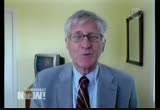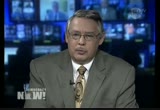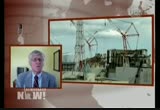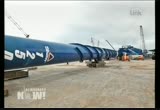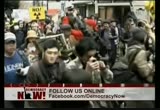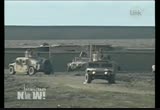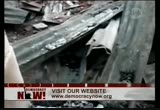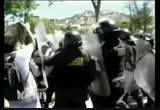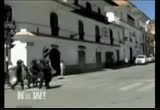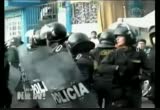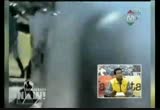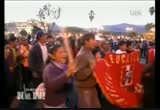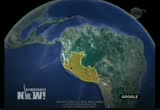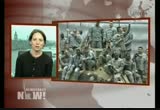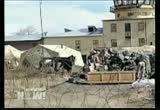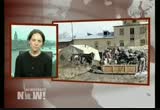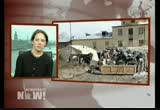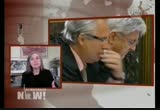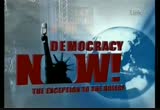tv Democracy Now LINKTV July 6, 2012 3:00pm-4:00pm PDT
3:00 pm
07/06/12 07/06/12 [captioning made possible by democracy now!] >> from pacifica, this is "democracy now!" >> that may disaster we're able to save. the cause of the accident was in fact, we believe, to be man- made. >> man-made, forcing, and preventable. those are the conclusions of a new japanese parliamentary report on last year's nuclear meltdown at fukushima. we will speak to former nuclear industry executive arnie gundersen about the report and what it means for u.s. plants. then a look at serious
3:01 pm
operations in africa and how the united states rendered, tortured and discarded one innocent man from tanzania. and protests against the u.s. mining giant newmont are escalating in peru. five participants in those protests have been killed in the past week. a state of emergency has been declared. >> the government is mistaken if it thinks it is going to crash the justified cries of the people. >> we will speak with amy goodman in spain today, 75 years after the bombing of that city. all of that and more coming up. this is "democracy now!," democracynow.org, the war and peace report. i'm juan gonzalez. i am filling in for amy goodman. the u.s. and european union are calling for new sanctions on syria similar to those used against the gaddafi regime ahead
3:02 pm
of the nato attack on libya. at an international friends of syria gathering in paris, secretary of state clinton invoked the threat of chapter 7 under the u.n. charter, which ranges from economic embargos to military force. the news comes as the regime of syrian president bashar al- assad has apparently suffered its highest level defection to date. on thursday, opposition activists said syrian general tlas, a member of the al-assad inner circle, had fled to turkey, reportedly over his anger at the syrian government's killing of civilians. in other syria news, the online whistleblower wikileaks continues to release documents from the syria files, more than 2 million emails said to be from syrian political figures, ministries, an associate companies over six-year period ending earlier this year. wikileaks spokesperson sarah harrison said the files would embarrass not only the syrian government, but many of its political foes.
3:03 pm
>> more than 2 million emails from syrian political figures, ministries, and associated companies dating from august 2006 to march 2012. this extraordinary data arrives from 680 syrian related entities or domain names, including those of the ministries of foreign affairs, finance, information, transport, and culture. the files shine a light on the inner workings of the syrian government and economy, but also reveal how the west and western companies say one thing and do another. >> the syria files were unveiled without wikileaks founder julian assange, who remains in the ecuadorian embassy in london seeking to avoid extradition to sweden. harrison read a statement on assange's behalf. >> to the massage cannot be with us today but has given this comment on the files. -- to an assange cannot be with us today, but has given this, to
3:04 pm
the files. it has [unintelligible] understand the interests, actions, and thoughts. it is only to understand this conflict we can hope to resolve it. >> three top figures from argentina's former ruling junta have been sentenced to additional time in prison for the deliberate theft of babies from political prisoners. former dictators jorge rafael videla and reynaldo bignone as well as former navy officer jorge acosta were found guilty of a systematic plan to take the babies of dissidents and adopt them into military families. all three are already serving jail sentences for other abuses under their regimes. grandmothers of the plaza de mayo praised the sentences. >> this is justice. it has arrived. we said it in 1996. at that moment we did not know
3:05 pm
if we would ever arrive at this moment and see it in our lifetime. i think it is healing for society to know they are being judged, condemned, and will continue to be so under the last crimes. >> it is believed the argentine military dictatorship killed at least 30,000 argentines during its rule from 1976 to 1983. republican candidate mitt romney continues to be president obama in the fund-raising race. thursday, romney's campaign said it took in more than $100 million in june. romney is expected to be the first candidate in history to out raise an incumbent president seeking reelection. speaking in ohio, president obama criticized romney's record on the auto industry bailout and announce the u.s. has launched a new trade complete over chinese tariffs. >> when the american auto
3:06 pm
industry was on the brink of collapse and more than 1 million jobs were on the line, governor romney said we should just let detroit go bankrupt. i refused to turn my back on communities like this. i was betting on the american worker, and i was betting on american industry. and three years later, the american auto industry has come roaring back this morning my administration took a new action to hold china a couple for unfair trade practices that harm the american auto makers. >> during his appearance in ohio, obama shared an emotional moment with a supporter -- with a walkman sister who recently died of cancer upholding a signature healthcare law. >> i believe that in america, nobody should go bankrupt because they get sick. i will work with anybody who
3:07 pm
wants to work with me to continue to improve our health care and health-care laws, but the law by past is here to stay. >> a florida judge has set a new $1 million bond for george zimmerman, the florida man who fatally shot the unarmed black teenager trayvon martin. zimmerman initially was freed after posting $150,000 bond, but was sent back to jail for lying about his finances. a record-breaking heat wave continues to scorch the midwest and could be returning east were. whether report said temperatures in the midwest could reach the triple digits. over at low temperatures barely dropped into the '70s. in celis, missouri, at least three he played -- in st. louis, missouri, at least three heat related deaths. thousands of homes are still without power after last weekend's violent storms.
3:08 pm
it is part of a pattern some have described as an early glimpse of the future of global warming. >> the nine nations is calling for a number of new taxes in the poor. help the world's including taxes on carbon emissions, financial transactions, and on the world's billionaires. the u.s. department economic and social affairs, unveiled the report. taxed, fore instance, 1%, the wealth held by billionaires, meaning everyone holding more than $1 billion in wealth, that would really not affect them. [unintelligible] there will holding -- [unintelligible]
3:09 pm
>> in bahrain, a child arrested for taking part in the protest against the u.s.-backed monarchy has been sentenced to one year of home confinement the 11-year- old was recently released after a month behind bars. thursday, a court ruled he must be monitored at home for the next 12 months. >> we were playing soccer and the ball went on the other side where the roads were blocked. when i went to get the ball, a private car came toward me and a person came running after me. the person got ahold of me as i tried to run. i am a small boy. why would they keep me under observation for one year? with victims of the 1984 bhopal disaster have announced plans to appeal in a recent judgment but a december 3, 1984, around 40 metric tons of toxic gases leaked from a union carbide plant in bhopal.
3:10 pm
the official death toll stands at around 3500. campaigners estimate the actual number is closer to 25,000 with many people still suffering. union carbide is own now by dow chemical. the second circuit u.s. court recently dismissed an effort to hold them and former chair warren anderson accountable for the disaster. the nation's largest presbyterian organization has nearly defeated a measure to divest companies linked to israel's occupation of the west bank and gaza strip. thursday, the presbyterian journal assembly voted 333 --. a 31 to reject a divestment measure. activists plan to seek another vote. california's become the sixth and largest a call for a constitutional amendment that would overturn citizens united. the landmark supreme court decision that paved the way for massive corporate spending to influence elections.
3:11 pm
on thursday, california's senate voted 24 to 11 to urge congress to draft an amendment against citizens united. the measure had passed the state assembly in march. in another vote thursday, the california senate passed a bill to help curb the mass deportations of undocumented immigrants who have not committed serious crimes. the california trust act would block local law enforcement from turning over immigrants for deportation unless they have been convicted of a serious felony. the bill is california's attempt to push back against the federal secure communities program, or local party sheriff and a prince with immigration officials. the federal program helped lead to the record deportation of around 400,000 people last year. supporters of call the measure in california and anti-arizona bill because it runs counter to the anti-immigrant crackdowns in arizona and other states. congressional report has found mortgage giant country what financial corp. offered hundreds
3:12 pm
of discount loans to lawmakers, government officials, another so-called vip in a bid to block the with red itswith red meats properties. -- would threaten its properties. countrywide played a key role in the housing crash and was once the country's biggest mortgage lender. according to the report, those who received countrywide special deals were able to influence dozens of legislative measures in the years leading up to the housing crisis. those are some of the headlines. this is "democracy now!," democracynow.org, the war and peace report. i'm juan gonzalez. we begin today's show in japan where a new parliamentary inquiry has concluded last year's nuclear meltdown of the fukushima daiichi nuclear power plant could of been prevented. the investigating commission appointed by the japanese diet concluded -- "it was a
3:13 pm
profoundly man-made disaster that could happen to the been foreseen and prevented." the commission how the government, regulators, and a nuclear operator responsible for the triple meltdown that occurred in march 2011 after powerful earthquake and tsunami. shuya nomura is a member of the commission investigating the nuclear accident. >> based on the facts gathered the cause of the accident was in fact, we believe, to be man- made. >> the more than 600-page report urged greater safety around nuclear plants and called on parliament to closely monitor a new nuclear watchdog due to be launched in a few months. it also urged the government to be more transparent about its relationship with the nuclear industry. last weekend, thousands marched across japan to protest the resumption of nuclear power. the country halted its nuclear
3:14 pm
production earlier this year for the first time since the 1970's, but resumed on saturday by bringing one shuttered plant back online. this is one of the protesters. towhile saying they're going restart, there are various problems. when i hear this, and under the circumstances, to have the plant running, all i can really say is the government and all those involved really shock me. >> for more, we're joined by arnie gundersen, a former nuclear power industry executive. he is the chief engineer at fairewinds associates and co- author of the greenpeace report, "lessons from fukushima." he often provides independent testimony on nuclear and radiation issues to the nuclear regulatory commission and other government agencies. arnie gundersen, welcome to "democracy now!" your initial reaction to the report released by the japanese
3:15 pm
parliament? >> we can no longer call it the fukushima daiichi action. that is when a bolt of lightning comes out of the blue and yet no idea what caused it. this report hits the nail on the head. this was man-made. the japanese have known for release 20 years, perhaps longer, that tsunami of this size could hit fukushima dai- ichi were in fact likely. and they never did anything about it. there is a coziness between the regulator and the people who run the nuclear power plants, not just in japan, but worldwide. this report focused on their relationship between regulator and the power plant owners in japan. >> one of the fascinating parts of the report, it says that at least one of the reactors may
3:16 pm
not actually have been damaged by the tsunami, but by the earthquake itself that preceded the tsunami, which would at least suggest major structural flaws in the design of these reactors to withstand earthquakes. >> there is some curious information on fukushima unit 1, the first one to fail. it was built by an american company, general electric, and an american engineer. it is hard for the japanese to blame themselves when this was an all-american design. strange things happened before the tsunami hit on fukushima they cheat unit 1. -- fukushima dai-ichi unit 1. there is the first mode, size
3:17 pm
seismically induced. i do not think the nuclear industry wants to acknowledge it could be faulty. it is certainly likely, and i agree with the report. >> what implications might this have for other nuclear plants in the united states, for instance, who may have had similar designs to the unit 1 in japan? >> there are 23 plants in the united states that are essentially are identical to all three of the dai-ichi plants that blew up. i am of the opinion that they should all be shut down. we had a bad design back in the 1970's. this design was known to be bad. there were a series of band-aid fixes, but it never really got to the root cause this is just too small a containment. two days after the accident, nuclear regulatory commission's
3:18 pm
key people were discussing it and one blurted out, "these are the worst containments in the world." so if we know they are the worst contaminants in the world, why are this 23 plants still running in the united states? >> and where are some of those 23 plants in the u.s.? >> the program, vermont yankee, oyster creek. there is a bunch in illinois. one is in chicago. there are several in the southeast as well. they are potentially all east of the mississippi, but near areas where there is high population densities. >> the parliament report was due to critical of the response to the disaster by the government and by tepco, the operator of the dai-ichi reactors. could you talk about that as well? >> i was on cnn three days after
3:19 pm
the accident saying this is as bad as chernobyl. the japanese never made that acknowledgment for eight weeks. that affects emergency planning. they did not move women and children out of the high radiation areas fast enough. they really did not want to admit what independent observers knew was already occurring. it is a separate catastrophe from the fact they had ample warning it could happen. >> when you say you initially warned it was as bad as chernobyl, what is your assessment now with all the additional information that has come out as to the potential long-term impact of what happened in japan? >> if there is any luck here, is the wind was blowing off shore
3:20 pm
and about 80% of the radiation wound up in the pacific. the amount of radiation released was clearly as much as chernobyl, that most of its headed out to sea. by the way, that would not be the case in illinois, for instance, were these directors -- reactors are surrounded. my estimate is over the next 30 years, we will see about 1 million cancers as a result of this. it could have been worse had the wind not been blowing out to sea. >> the report also criticized the decision of the japanese prime minister to rushed to the site, within a day of the disaster, saying he actually impeded in delayed -- and it delayed the efforts of the workers on the scene to control the disaster. could you elaborate on that? >> you bring in the prime
3:21 pm
minister, tension is diverted from what is important, which is a nuclear accident. jimmy carter did that after three mile island. he came about three days after the accident in an attempt to quell the public fears. but this was different. there was a grave disconnect between tokyo electric and the prime minister's office. they did not trust each other. of course the prime minister is taking credit, claiming he forced tokyo electric to not abandon the side. on the opposite side of the argument, he arrived on site and diverted the attention. i think it is a secondary issue to the broader issue of the fact the regulator and utilities recently in bed together. >> also, it was quite unusual the report leveled some criticism at the culture of japan, and the tendency of the
3:22 pm
public to not question authorities, to not tolerate dissent, and really suggested the attitude and the culture of the japanese public needs to change. do you consider that unusual in a report of this type? >> it is tougher the japanese to a mitt culturally they really respect authority -- it is tough for the japanese to admit culturally the really respect authority. it is not just japan. i was a senior vice president and when i was fired, i was talking to a highly placed nuclear attorney in washington. he said, "in this business you're either for us or against us, and you just cross the line." the industry, no matter if it is in the states or japan, is essentially a closed fortress.
3:23 pm
independent experts have a very difficult time having their opinions aired. >> what do you think will be the impact of this report here in the u.s.? obviously, the obama administration is on record supporting the expansion of more nuclear plant in the united states. how do you think this will affect that direction the obama administration and many republicans in congress' support? >> i am concerned the industry, the nuclear industry in the u.s. -- they say it is a japanese problem, and it is night. the influence of corporate money has a huge effect on congress. it is not a democrat or republican issue. there are no democrats and republicans when it comes to nuclear. they are all pro-nuclear. there were some hearings about
3:24 pm
the head of the nuclear regulatory commission. the industry did not like the fact he was trying to regulate, so the action had congressional hearings to try to put them on the carpet. as a result, he resigned. so this kind of corporate pressure on congress works its way down to the commissioners -- there are five of them. the commissioners of fact the staff. it is just as insidious here as it is in japan. in fact, i think, worldwide. >> arnie gundersen, thank you. former nuclear industry engineer. we have to take a break, but will return in a moment. stay with us. ♪ [music break] ♪ [music break]
3:25 pm
3:26 pm
operations in africa. the nation magazine has just published an exposé title, "how the u.s. rendered, tortured and discarded one innocent man." the article by human rights investigator clara gutteridge recounts the ordeal of the tanzanian man named suleiman abdallah who is captured in mogadishu in 2003 by a somalian warlord and handed over to his officials, had rendered him to afghanistan for five years of detention and torture. imprisoned and three different u.s. facilities, abdallah said it is subjected to severe beatings, prolonged solitary confinement, forced nakedness and humiliation. he said he was also sexual assaulted, locked naked in a coffin and forced to lie on a wet mat, naked and handcuffed. suleiman abdallah was finally released in july 2008 from bagram air force base, with a piece of paper confirming his innocence. however, has received neither reparations nor apologies for
3:27 pm
his ordeal. for more, we're joined in london by clara gutteridge, who used to work as a secret prison investigator the human rights organization. welcome to "democracy now!" >> thank you. >> could you lay out for us how you came across this case, and how you got involved in suleiman abdallah's situation? >> my job used to be finding disappeared people, people have been disappeared by the united states and the context of the war on terror. my methods were a varied. one thing africa related, was interview people had just been released from secret prisons and ask them about other people they were detained with. they could usually remember quite well who they were detained with. i built up this list of people. [unintelligible]
3:28 pm
i had a list of people -- [unintelligible] >> we seem to have lost clara gutteridge. we're going to see if we can get her back. a recent piece for the nation is called, "how the u.s. rendered, tortured and discarded one innocent man." to see if we can get that connection back. ok, well we will take a break while we try to see if we can get clara gutteridge back on the line. we will be back in a moment. ♪ [music break] ♪ [music break]
3:30 pm
>> this is "democracy now!," democracynow.org, the war and peace report. i'm juan gonzalez. we're still having trouble getting to clara gutteridge, so we're going to move to peru for the government has declared a state of emergency and the mountain region of cajamarca. thousands gathered in recent days to protest the expansion of a gold mine owned by the u.s.- based newmont mining. the mine is already the largest in south america. using live ammunition against the protesters, police killed five people this week alone. on wednesday, and a dramatic video broadcast nationally on peruvian television, police severely beat a former roman catholic priest who had rallied protesters despite emergency measures restricting freedom of
3:31 pm
assembly. the video shows police walking up to the protest leader, marco arana, as he sat on the bench in the central square of the region's capital city. they saw around him and hit them with batons, and then arrest him read arana later tweeted that "in the police station they hit me again, punches in the face, kidneys, insults." at a news conference, arana blamed peru's president humala of being behind the violence. >> the government is mistaken if it thinks is going to crashed the justify cries of people of cajamarca. we have to say to it clearly to president humala, the defense banister, and prime minister, like the gospel says, do not fear those who kill the body but fear those who kill the
3:32 pm
soul. >> when humala ran for office, he promised to stop the $5 billion expansion of the yanacocha gold mine, which is about 20 miles north of the major city of cajamarca in the peruvian andes. the just a few miles away would extend into a pristine landscape of wetlands, lakes, and streams that are the region's water source. president humala now openly supports the mine's expansion and one of the country's poorest regions. he recently said, "there are dams and roads that have to be built. it is not fair to cajamarca after having given so much to the country." for more on the situation which continues to escalate, we're joined in new york by bill weinberg, a freelance journalist was recently in cajamarca reporting for the progressive magazine. welcome to "democracy now!" you have just gotten back. how has this protests been
3:33 pm
growing for the last number of weeks there? >> walked, they started a general strike on may 31. this is just the latest in a series of ongoing protests that have been going on for years. every time the company yanacocha propose an expansion, the local people get organized and shut down businesses and blocked roads. it was significantly started to heat up last year when the proposed moving into this area called konga, where there are five alpine lakes which the company proposes to destroy. they're going to turn them into giant mining pits and dumped mining waste. water sources in the region have already been diminished, largely -- it appears, largely to the mining operations. the people said enough is enough.
3:34 pm
they launched this campaign. there's been sort of a back-and- forth within negotiate with the government. things finally broke down and on may 31, they launched what they call an indefinite general strike. >> the miners in south america, especially peru, bolivia, have always been some of the most active, radical. what has been the relationship between the communities and the workers in these mines? >> unfortunately, extremely divided. most of the workers in the minds of our people from the local communities. not all of them, but a great deal of them. unfortunately, yet the situation where the villages, which have a lot of people who work in the minds supporting the project and the majority of the colleges, which are more concerned with keeping their agricultural way of life alive oppose the
3:35 pm
project. it is really divided the community. >> and the impact of the beating of this priest, the video that was caught across the nation? what was the aftermath of the broadcasting of that video? >> well, just one more outrage and a long string of outrages. mark arana has a political organization and is a key leader. just the day before, he was -- the day before he was arrested, he issued a statement saying the only way the project could be imposed was through a blood bath. but it is not just him read a few days before that, santos, the regional president of cajamarca, equivalent to a governor, more less, had -- an investigation had been opened
3:36 pm
into him by the national authorities on charges he was plotting to "overthrow" the government. this had to do with a speech he gave at a rally where he sort of rhetorically asked the crowd in reference to president humala, what happens to a president who breaks their vows? the crowd responded, "they are removed." the national authorities, judicial authorities then opened investigation into him read he and mark arana and several other of the protest leaders had already been facing an investigation since march when i was down there, in fact, about blocking highways and that sort of thing in relation to the protests that have been going on. the regional government of cajamarca itself is in support of the movement against the expansion of the mine. >> what about the turnaround of the president? he was one of a string of lot
3:37 pm
american presidents elected in the last decade, nationalist, someone who is going to oppose for exportation. now he is turning around and supporting an american company, an expansion of one of the biggest mines in the country. >> the people feel extremely portrayed. there was a cabinet purge last year, i believe it was in november, which was seen as a turning point where these left- wing populist touch the people who were in the cabinet were given the sack. more conservative, pro-corporate elements took over. one of the people sacked was the environment minister who just days before the cabinet purge had said, "well, we should reexamine the impact statement for the konga project scrap it had been previously ok.
3:38 pm
they had entered into the free- trade agreements with washington and perceived as pro- business, open up vast areas of the country to the mining and oil industries, and, ironically, humala had run against for more nationalist and populist platform. >> tell us something about newmont, the company at the center of all of this. its holdings there as around the world. >> it is 51% stake holder in the yanacocha mine. 5% is owned by the world bank. they also have holdings all over the world. recently, in fact, they said if they are not going to be able to move ahead with the project in peru, they are quite ready to pursue other opportunities both in the u.s., nevada, as well as indonesia and other countries around the world. they are sort of holding this
3:39 pm
out as a threat, that they have plenty of other balls in play, so to speak, in various countries around the world. >> and their record, in terms of labor relations, environmentally, is it unusual for a mining company pretty much pro forma for the extracting industry? >> i don't know if i can say is unusual, but certainly, the record in the mining question, yanacocha, in peru, has been extremely problematic at best. there has been a lot of water sources that have gone dry. there was a terrible spill with mercury, which contaminated the local water sources several years ago. a lot of the mountains in the region have been turned into giant mining pits.
3:40 pm
communities have started to see the water disappear. >> bill weinberg, thank you for joining us, freelance journalist was recently in cajamarca covering ithe story. we're joined by the british human-rights investigator, clara gutteridge. published was just titled, "how the u.s. rendered, tortured and discarded one innocent man." the recounts the ordeal of a tanzanian man named suleiman abdallah. clara gutteridge, hopefully, we can keep you on the line this time but welcome back. continue with where you left off talking about how you learned of suleiman abdallah's situation. >> thank you. i was in my job at reprieve a couple of years ago essentially involved building files on people who disappeared in the context of the u.s. war on
3:41 pm
terror, people being held in secret prisons around the world. in one of the cases i was building a file on was suleiman abdallah. i routinely would interview people who just been released from u.s. detention, put it with other documentation and ultimately, hopefully, find out where someone was being held and get a representation or authorization to represent them in prison. the thing that happened with suleiman abdallah's file, a grew and grew. i still had no idea where he was but i found out this fascinating stuff about how he was picked up in 2003 in somalia, sold by a warlord. his nickname is travolta because he was fond of dancing. but i had no idea where he was being held. every time i interviewed someone, i would ask if they knew suleiman abdallah, an east
3:42 pm
african and the answer was always, "no." in 2008 i learned he was being held at bagram air force base and afghanistan, which is, or was, guantanamo bay's lesser evil twin. published lesser known evil twin. then he had been released and was in tanzania or zanzibar. i went to meet him. >> can you trace for us his amazing odyssey from country to country and how this happened? >> well, it is difficult to piece together. we only know some of what happened. he is from zanzibar. he grew up in zanzibar. he was fond of fishing and good with boats. he ended up being a traitor going up and down the coast from zanzibar of the kenyan
3:43 pm
coast -- trader going up and down the coast from zanzibar to of the kenyan coast. he was abducted by a warlord who still lives in mogadishu. he is one of the most powerful people still in somalia. he has had various roles in somalian government. members of the cia, rendered him to sue secret prisons in afghanistan. and afghanistan, he was in a prison we think called the dark prison where prisoners are held in pitch black with music pumping 24 hours a day, very seriously abused with no access to lawyers. then it was taken to the salt
3:44 pm
pit, not much better. alternately, to bagram air force base where he was held for about five years until it was released and sent back to tanzanian in 2008. >> in the original reason why the u.s. government -- and the original reason why the u.s. government took him and jailed him? >> right. it is difficult to piece together because the u.s. government will not talk about why this happened. it seems somewhere in somalia between 2002-2005, there was a system where the cia would pay warlords money, essentially, for so-called terror suspects. the same thing happened in pakistan. 85% of people at guantanamo bay were sold for a bounty. in somalia, this was going on as well but it was much quieter. there was less attention. we think suleiman abdallah their
3:45 pm
racially have been sold as are passed off, if you like, as a notorious terrorist suspect called fazl was ultimately killed last year. of course, he was a nobody from tanzania. one thing we have noticed, it tended to be light skinned, for looking people that were sold, maybe as in pakistan, it was more arab looking people. people could be passed that as something suspicious. >> i summarized in the introduction, some of what he went through. could you describe for us what you learned was some of the torture and treatment that he underwent? >> the worst of the torture we're not authorized to talk about because it is too painful for him to talk about, but what i can say is he was subjected to some of the worst torture have
3:46 pm
ever encountered after interviewing over 100 u.s. torture victims. he was routinely beaten. he was sexually assaulted. he was locked in a cage, locked in a coffin-shaped box. he was subjected to extreme temperatures of hot and cold. he was threatened to would never be released again. the list is endless. it took two intensive days of debriefing for the medical experts to document what he went through. obviously, i cannot release summarize it in such a short space of time. >> who did he say inflicted this torture on him? >> generally speaking, it was a series of people, but mainly u.s. personnel. dod and other, probably the cia, although, we cannot be certain.
3:47 pm
>> could you tell us about the overall role of the united states forces, cia and special forces in africa where he was originally conducted? >> win suleiman abdallah was abducted in 2003, there was an arrangement between the cia and somali warlords who were then in control of most of somalia euphemistically called the alliance of peace and counterterrorism. it was really an arrangement where warlords would go around and pick people up and sell them for large amounts of money to the cia. at that time, people were rendered into different parts of the world to be held in different u.s. prisons.
3:48 pm
like everywhere else, since it let's say 2007, the u.s. has been increasingly looking to get out of the detention game. they're no longer running massive presence around the world where detainees are held. now in east africa, the war on terror is alive and kicking, but more outsourced and decentralized than it used to be. which means the role of the partner states is much more important. they are receiving massive amounts of money and aid to conduct counterterrorism. what we increasingly see is these states during the jailing either on behalf of the u.s. or perhaps another joint detention operation, and for those of us working on rule of law in trying to assure these prisoners get the rights they deserve, it is even more difficult than working with prisons on the face of it better offers the run by the united states. >> i want to ask about u.s.
3:49 pm
operations but last year, jeremy scahill of the nation traveled to mogadishu and revealed the existence of a secret cia facility in that city. >> we arrived in mogadishu and within days discovered the cia had just finished construction of a pretty massive compound at the international airport in mogadishu. the compound, which is not even hidden in plain sight, is just in plain sight, looks like a gated community. it has about a dozen brand-new buildings inside of it. it has guard posts at each of its quattro corners. it is on the banks of indian ocean. next to it are six or eight small hangars. the cia has its own aircraft there. >> your response to this jeremy scahill report? >> it is common knowledge
3:50 pm
amongst not only somalis in mogadishu, but most people who go through mogadishu that this present exists and there is clearly, a multi-lateral detention operation going on in somalia that involves secret detention of prisoners. the only. -- the only person who said he did not know anything about it. situationn abdallah's now? he has gotten no compensation for his years of unjust and jailing? >> he is struggling against the odds of rebuilding his life after what his been through. u.s. torture is totally unravelling people. people tried to put themselves back together, rebuild their lives.
3:51 pm
suleiman abdallah is doing extremely well, but it is very, very difficult for him. >> clara gutteridge, thank you for joining us, human rights investigator. her recent piece for the nation is called, "how the u.s. rendered, tortured and discarded one innocent man." we will be back in a moment. ♪ [music break] i am sorry, we're going to stick here. no more breaks in this segment. we're going to go to amy. we end today's show with amy goodman. she is in spain. 75 years after the historic bombing of the city. can you hear me? >> i can read it is great to be with you and the viewers and listeners of "democracy now!" around the world. this year is a historic one in spain. 75 years ago on april 26, 1937,
3:52 pm
the town where i am right now in spain was bombed and ultimately incinerated. 80% of the buildings were destroyed it is known now the german and a tie and fascist forces, the german nazis, at times under mussolini, worked in the franco regime, destroyed the city. there are remembrances all over this country. i am actually sitting in the center which -- speaking with different activists and survivors. we walked just a few minutes ago outside. the civilian areas were destroyed the question is, who put in the orders for the civilian areas to be destroyed but the military areas, like the factory that made chemical
3:53 pm
weapons and on to make guns, it still stands. 75 years after the symbol of this war is the garment center is being turned into a cultural center after young people occupied the building today and said this must and as a symbol of peace, a symbol of culture. the reason people know this because apollo picasso print of a picasso who after he heard about the bombing of this city in his home country of spain, and a 21-day friend to come he painted the painting that now hangs in a museum in madrid called -- is shows the agony of war etched in the faces of the animals and the people.
3:54 pm
it shows the power of culture, which is also why i am here in spain. tomorrow night i will be speaking at a three-day conference called "culture takes center stage." the power of art and resistance. public picasso said the painting could never come home to spain until franco, the fascist leader, fell. now the paintings sits in madrid. the people want it to rest here and which is based. in the u.s., we know because the tapestry productions made by picasso hung in front of the u.n. security council in new york for decades. the i talked about this yesterday. but it was not lost on the
3:55 pm
higher-ups' at the u.n. when the u.s. was about to go to war in iraq, the irony of this anti-war symbol in the backdrop of the u.s. leaders making pro-war announcements, so they shrouded the guernica with a blue curtain but i think it is our job as citizens of the world to pull back the curtain and show the reality of war, poverty, inequality. it is certainly what is seen all over and my the people of guernica and people of spain care so much about reclaiming their history. instead of being a symbol of war and destruction, being a symbol of peace, culture, and resistance. >> amy, in terms of the conference being held, is this a conference of people from all over spain or europeans from
3:56 pm
other parts of the continent as well? >> yes, people from all over the world have gathered this weekend for a conference to talk about peace, culture, and resistance. but in the lead up to this, from april 26 until today, on the 75- year anniversary, people throughout spain have been observing what happened during the fascist times back in 1937. i think it is always -- also very important to point out there is a movement in spain. just this week thousand one of the supreme court in madrid. that was the court where all as our garzón, the prosecutor, was tried. he is famous for trying to get pinochet extradited to spain for a trand trial for crimes against
3:57 pm
humanity. he succeeded in getting pinochet arrested in london for a year. he was crusading around getting osama bin laden indicted. but it was only one said, "those of power during the franco years have to be held accountable, investigate the mass raids that dot the countries of spain, some say that spain is the second only to cambodia and the numbers of mass unmarked graves that there are. it was only when poultice our cause on said we have to take on our own history that he was -- when garzón said we have to take on our own history, that it was brought to light. in this country, he can no longer practice law. i think is part one of campaign around the world, upholding those in power accountable.
3:58 pm
that is why guernica take center stage in spain and around the world as a symbol of both destruction, but also of survival and reclaiming history to understand where we are and how we can shape our future. >> thank you for joining us from the spanish city of guernica. we will get more reports from amy when she comes back next week. that is today's show. democracy now! is looking for feedback from people who appreciate the closed captioning. e-mail your comments to outreach@democracynow.org or mail them to democracy now! p.o. box 693 new york, new york 10013. [captioning made possible by democracy now!]
137 Views
IN COLLECTIONS
LinkTV Television Archive
Television Archive  Television Archive News Search Service
Television Archive News Search Service 
Uploaded by TV Archive on

 Live Music Archive
Live Music Archive Librivox Free Audio
Librivox Free Audio Metropolitan Museum
Metropolitan Museum Cleveland Museum of Art
Cleveland Museum of Art Internet Arcade
Internet Arcade Console Living Room
Console Living Room Books to Borrow
Books to Borrow Open Library
Open Library TV News
TV News Understanding 9/11
Understanding 9/11

